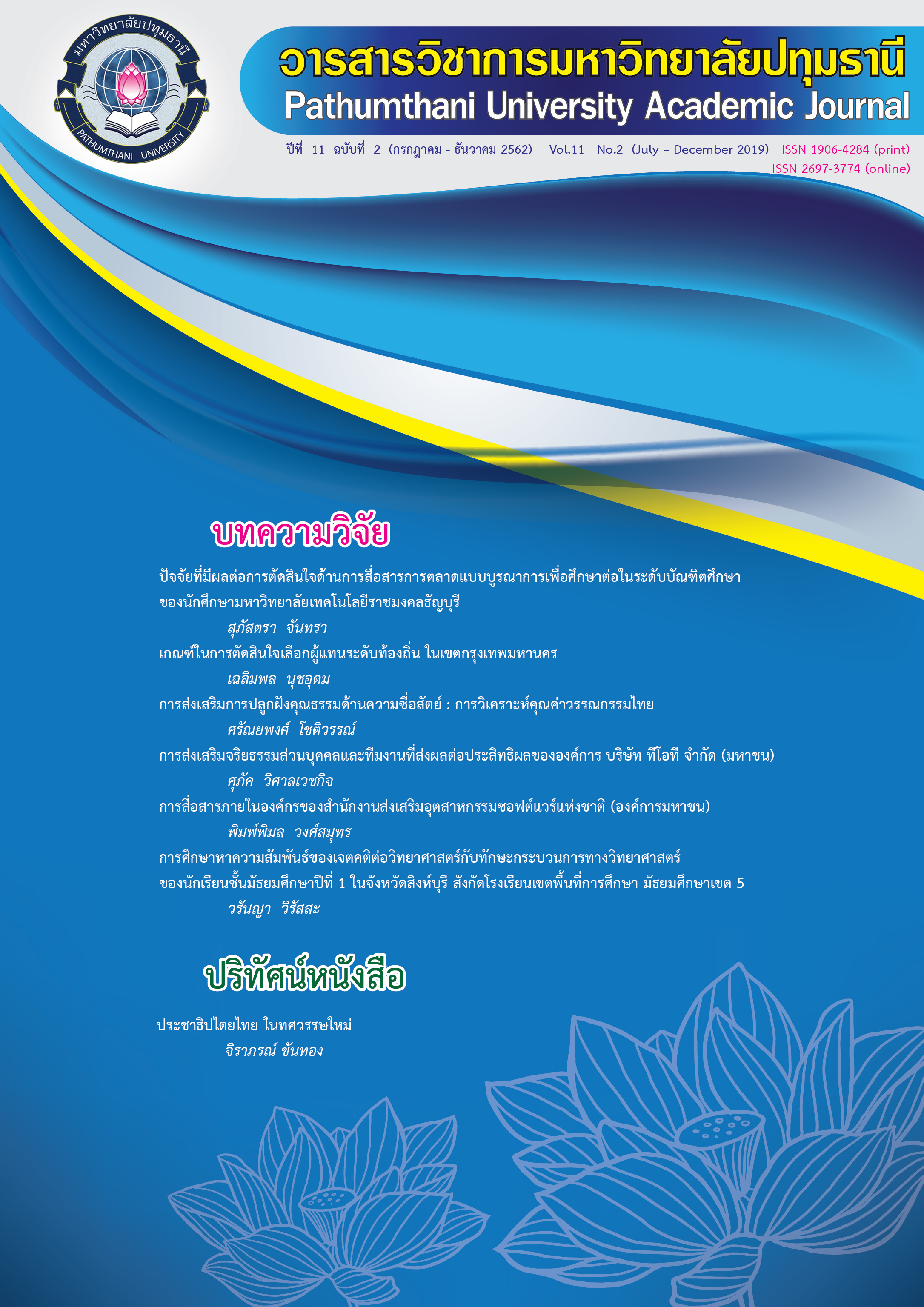Promoting the Inculcation of Honesty : An Analysis of Values in Thai Literature
Keywords:
Promoting, Analyze Moral, Honesty, Values, Thai LiteratureAbstract
This research aims to analyze moral values in Thai literary works in respect of honesty inculcation. 53 novels by Thai national artists from the literature branch are studied. Each of them has been reproduced in the forms of either TV dramas or movies three or more times. The research uses content analysis and language analysis in aesthetic and ethical perspectives. The analysis of main ideas and characters’ behavior in the 53 novels indicates that the value of aesthetics is caused by emotions, susceptibility, sadness, impressions, and fear. The aesthetics give rise to the reader’s imaginative participation in the characters’ points of view, understanding their emotions and thoughts. Thus, it can be said that aesthetic values have the power to spark ideas and create ethical values that the reader realizes in virtue of honesty from characters’ actions. Through the aesthetic values, the reader understands more of the characters’ actions and perceives the ideas and attitude, as well as realizes ethical values in respect of the honesty of the characters. The ethical values in the novels can be classified as follows: Honesty to oneself can be divided into keeping one’s words, thoughts and actions in each of the 53 novels, keeping promises in 27 of the novels, following rules and laws in 26 of the novels, avoiding causing others to suffer, avoiding taking advantage of others, and avoiding blaming others in all 53 novels. Respect for duty can be divided into performing one’s duty according to law as best as one can in 36 of the novels, avoiding favoritism in order to gain personal interest and benefit without fearing the law in of the 20 novels, and working with transparency and willing to be investigated in 3 of the novels. Honesty towards society and nation can be divided into keeping promises not to harm society and the country with loyalty to the nation, religion and king as well as taking into account social and national welfare in 16 of the novels, and valuing the law and realizing one’s duty as a Thai citizen not to ignore social problems in 9 of the novels. Based on the above data, the most frequent moral values in the novels consist of honesty to oneself followed by respect for duties and honesty towards society and country, in descending order. Therefore, the promotion of inculcating moral values of honesty must begin with honesty to oneself in order to step towards respect for duties and honesty towards society and country. When human beings respect themselves and are honest to themselves, the very basic self begins to develop, and this will lead to the development of society and country accordingly.
References
กนกศักดิ์ แก้วเทพ. (2557). วิถีใหม่แห่งการพัฒนา:วิธีวิทยาศึกษาสังคมไทย.กรุงเทพมหานคร:คณะเศรษฐศาสตร์ จุฬาลงกรณ์มหาวิทยาลัย.
กฤษณา อโศกสิน. (2535). ปีกทอง. (พิมพ์ครั้งที่3). กรุงเทพมหานคร: สำนักพิมพ์บ้านวรรณกรรม.
คณะกรรมการการศึกษาแห่งชาติ,สำนักงาน. (2559). แผนการศึกษาแห่งชาติ (พ.ศ. 2545 – 2559).กรุงเทพมหานคร: หวานกราฟฟิค.
คณะกรรมการข้าราชการพลเรือน,สำนักงาน. (2558). คู่มือการจัดทำจรรยาบรรณราชการและแนวทางปฏิบัติเชิงพฤติกรรมตามจรรยาบรรณข้าราชการ. กรุงเทพมหานคร:สำนักงานคณะกรรมการข้าราชการพลเรือน.
คณะกรรมการการพัฒนาเศรษฐกิจและสังคมแห่งชาติ,สำนักงาน. (2548). เศรษฐกิจพอเพียงคืออะไร. กรุงเทพมหานคร: สำนักงานคณะกรรมการการพัฒนาเศรษฐกิจและสังคมแห่งชาติ.
คึกฤทธิ์ ปราโมช. (2550). สี่แผ่นดิน. (พิมพ์ครั้งที่21). กรุงเทพมหานคร: สำนักพิมพ์บ้านวรรณกรรม.
จุลลดา ภักดีภูมินทร์. (2552). ขมิ้นกับปูน. (พิมพ์ครั้งที่ 5). กรุงเทพมหานคร: สำนักพิมพ์เพื่อนดี.
จำนงค์ อดิวัฒนสิทธิ์และคณะ. (2559). สังคมวิทยา. (พิมพ์ครั้งที่ 1). กรุงเทพมหานคร: สำนักพิมพ์มหาวิทยาลัยเกษตรศาสตร์.
เจตนา นาควัชระ. (2557). ความอยู่รอดของมนุษยศาสตร์ไทย.กรุงเทพมหานคร: อมรินทร์พริ้นติ้งกรุ๊ป.
ทมยันตี. (2538). คำมั่นสัญญา. (พิมพ์ครั้งที่4). กรุงเทพมหานคร: สำนักพิมพ์บ้านวรรณกรรม.
ทมยันตี. (2532). คู่กรรม. (พิมพ์ครั้งที่2). กรุงเทพมหานคร: สำนักพิมพ์บ้านวรรณกรรม.
ทมยันตี. (2534). คุณหญิงนอกทำเนียบ. (พิมพ์ครั้งที่3). กรุงเทพมหานคร: สำนักพิมพ์บ้านวรรณกรรม.
ทมยันตี. (2546). ร่มฉัตร. (พิมพ์ครั้งที่7). กรุงเทพมหานคร: สำนักพิมพ์บ้านวรรณกรรม.
บวรศักดิ์ อุวรรณโณ. (2559). วิกฤตเศรษฐกิจและวิกฤตทางการเมืองในประเทศไทยในอดีตและปัจจุบัน. นนทบุรี: สถาบันพระปกเกล้า.
โบตั๋น. (2528). ผู้หญิงคนนั้นชื่อบุญรอด. (พิมพ์ครั้งที่2). กรุงเทพมหานคร: สำนักพิมพ์บ้านวรรณกรรม.
โบตั๋น. (2533). บัวแล้งน้ำ. (พิมพ์ครั้งที่2). กรุงเทพมหานคร: สำนักพิมพ์บ้านวรรณกรรม.
โบตั๋น. (2533). สุดแต่ใจจะไขว่ขว้า. (พิมพ์ครั้งที่2). กรุงเทพมหานคร: สำนักพิมพ์บ้านวรรณกรรม.
ประภัสสร เสวิกุล. (2551). ลอดลายมังกร. (พิมพ์ครั้งที่19). กรุงเทพมหานคร: สำนักพิมพ์นามีบุ๊ค.
รัฐบุรุษ พลเอกเปรม ติณสูลานนท์, มูลนิธิ. (2559). ปาฐกถา เรื่องแนวทางพระราชดำริสู่การบริหารจัดการภาครัฐ .(พิมพ์ครั้งที่ 1). กรุงเทพมหานคร: มูลนิธิรัฐบุรุษ.
รื่นฤทัย สัจจพันธุ์. (2558). วรรณกรรมปัจจุบัน. (พิมพ์ครั้งที่20). กรุงเทพมหานคร: สำนักพิมพ์มหาวิทยาลัยรามคำแหง.
โรสลาเรน. (2542). เงา. (พิมพ์ครั้งที่3). กรุงเทพมหานคร: สำนักพิมพ์บ้านวรรณกรรม
ว.วินิจฉัยกุล. (2535). ปัญญาชนก้นครัว. (พิมพ์ครั้งที่3). กรุงเทพมหานคร: สำนักพิมพ์บ้านวรรณกรรม.
สายทิพย์ นุกูลกิจ. (2559). วรรณกรรมไทยปัจจุบัน. (พิมพ์ครั้งที่13). กรุงเทพมหานคร: เอส อาร์พริ้นติ้ง.
Downloads
Published
How to Cite
Issue
Section
License
บทความที่ได้รับการตีพิมพ์เป็นลิขสิทธิ์ของวารสารมหาวิทยาลัยปทุมธานี
ข้อความที่ปรากฎในบทความแต่ละเรื่อง เป็นความคิดเห็นส่วนตัวของผู้เขียน กองบรรณาธิการไม่จำเป็นต้องเห็นด้วยเสมอไป และไม่มีส่วนรับผิดชอบใด ๆ ถือเป็นความรับผิดชอบของผู้เขียนแต่เพียงผู้เดียว



